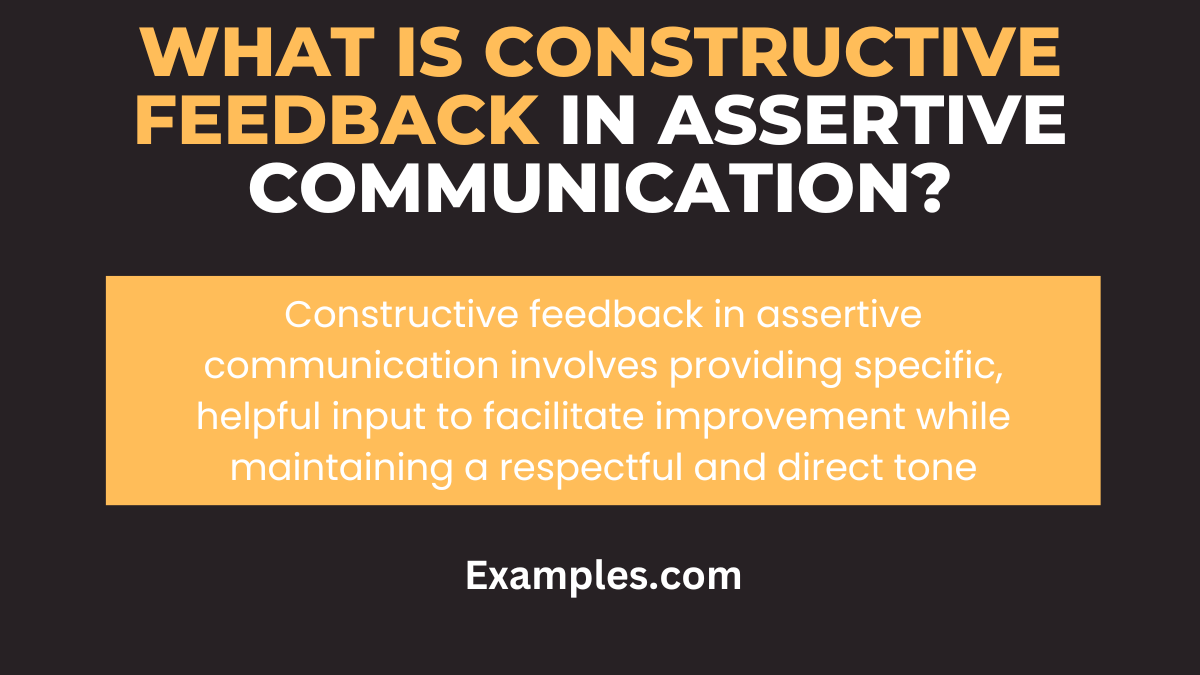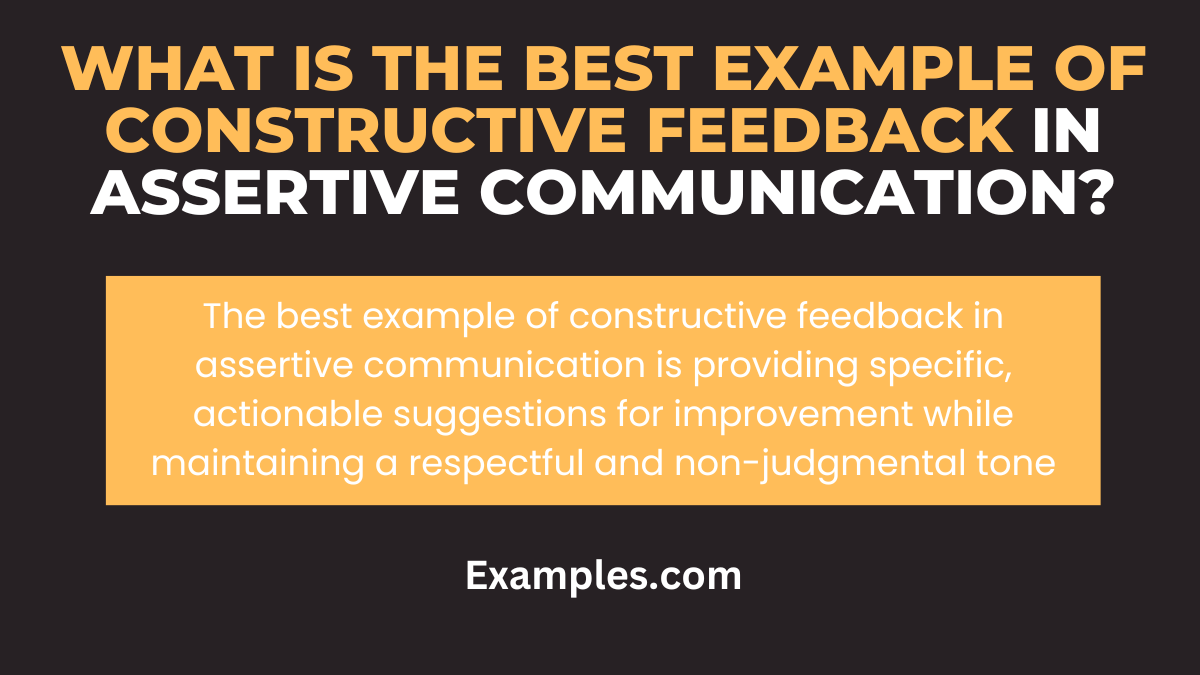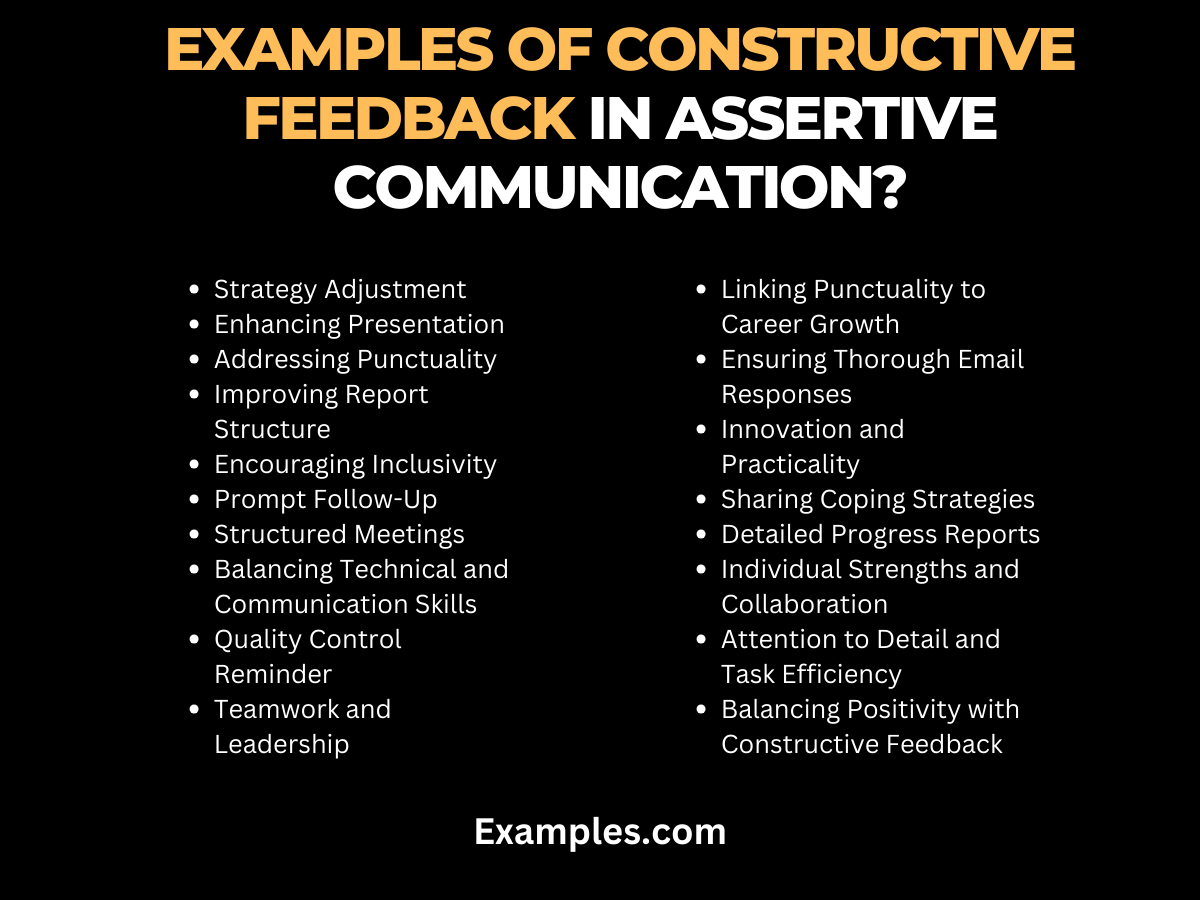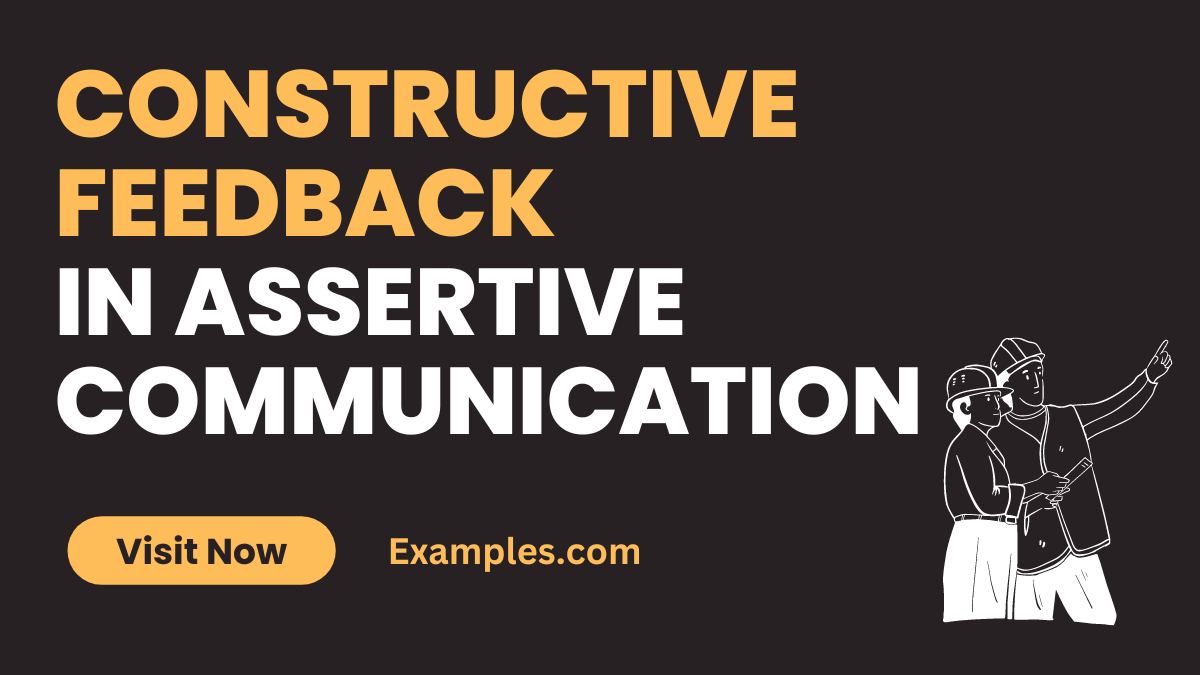19+ Constructive Feedback in Assertive Communication Examples
In today’s collaborative environments, mastering Constructive Feedback in Assertive Communication is crucial. This guide delves into the dynamics of delivering feedback with confidence and empathy, ensuring it is both heard and respected. We explore practical strategies to articulate your thoughts clearly and respectfully, enhancing mutual understanding and fostering positive change. Dive into this comprehensive journey towards effective, assertive communication that empowers and uplifts.
What is Constructive Feedback in Assertive Communication?

Constructive feedback in assertive communication is a vital skill that involves expressing thoughts, feelings, and needs honestly and directly, while also respecting others. It’s about delivering feedback in a way that is clear, empathetic, and focused on positive change. This approach ensures that feedback is not only heard but also valued, leading to effective communication and improved relationships.
What is the Best Example of Constructive Feedback in Assertive Communication?

One of the best examples of Constructive Feedback in Assertive Communication is when a manager provides specific, actionable feedback to an employee. This feedback is delivered in a respectful tone, highlighting areas for improvement while acknowledging their strengths. For instance, the manager might say, “I appreciate how you handled the project’s challenges. However, for future projects, it would be beneficial to communicate updates more frequently to keep the team aligned.” This approach combines Empathy in Assertive Communication with clear, solution-focused feedback, fostering a positive and productive work environment.
20 Examples of Constructive Feedback in Assertive Communication

Constructive feedback in assertive communication is a vital skill, enabling clear, respectful, and effective exchanges. It involves expressing thoughts and feelings confidently, while respecting others’ perspectives. This approach fosters positive interactions and personal growth. Incorporating skills like Active Listening in Assertive Communication and Respectful Tone in Assertive Communication, these examples showcase how to convey feedback constructively and assertively.
- “I appreciate your hard work on this project, but I think if we adjust the strategy slightly, it could be even more effective.” This statement shows recognition of effort while suggesting improvements.
- “Your presentation was very informative. For next time, could you include more visual aids to enhance understanding?” This feedback praises the content while advising on presentation style.
- “I noticed you’ve been arriving late recently. Is everything okay? I’m here if you need to talk.” Expressing concern for wellbeing while addressing an issue.
- “Your report was very detailed, but it might be more impactful with a concise summary at the beginning.” Complimenting the effort and suggesting a structural improvement.
- “I value your creativity in team meetings. Could you also make sure to let others share their ideas too?” Acknowledging a positive trait while encouraging inclusivity.
- “You handle client queries very well. To enhance customer satisfaction, perhaps follow-up emails could be more prompt.” Complimenting skill in handling clients and suggesting a follow-up improvement.
- “I appreciate your enthusiasm, but let’s try to stick to the agenda during meetings for time efficiency.” Valuing enthusiasm while guiding towards structured meeting conduct.
- “Your technical skills are impressive. Balancing this with stronger communication skills would make you even more effective.” Praising technical ability and advising on communication skills enhancement.
- “You’ve made great progress, but remember to double-check for errors to maintain our quality standards.” Recognizing progress and reminding about quality control.
- “Your teamwork is commendable. If you could also take the lead sometimes, it would showcase your leadership potential.” Applauding teamwork and encouraging leadership.
- “Your punctuality is excellent. Maintaining this along with consistent performance will be great for your career growth.” Praising punctuality and linking it to career development.
- “You’re very responsive to emails. Ensuring thoroughness in your responses will enhance communication effectiveness.” Commending responsiveness and suggesting thoroughness.
- “Your innovative ideas are a great asset. Balancing them with practical implementation strategies would be beneficial.” Valuing innovation and advising on practicality.
- “You handle stress well. Sharing your coping strategies with the team could help everyone.” Acknowledging stress management skills and suggesting team guidance.
- “Your project updates are always timely. Including more detailed progress reports would be helpful.” Complimenting timeliness and advising on report detail.
- “You excel in individual tasks. Collaborating more with the team could bring new perspectives to your work.” Recognizing individual strengths and suggesting collaboration.
- “I’ve noticed your improvement in handling difficult situations. Continuing to develop these skills will benefit your professional growth.” Acknowledging improvement in a challenging area.
- “Your attention to detail is outstanding. Pairing this with efficiency in task completion would be ideal.” Praising attention to detail and advising on efficiency.
- “Your positive attitude is infectious. Balancing this with constructive feedback to peers will foster a stronger team dynamic.” Appreciating positivity and recommending balanced feedback.
- “You adapt well to change. Sharing this adaptability approach with colleagues can inspire them too.” Commending adaptability and suggesting peer inspiration.
How to Write Constructive Feedback in Assertive Communication?
1. Active Listening
Practice Active Listening in Assertive Communication. Ensure you fully understand the situation or behavior you are addressing. Listen without interrupting and acknowledge the other person’s perspective.
2. Clarity and Specificity
Use clear, specific language. Avoid vague statements that can lead to misunderstandings. Be precise about what behavior or outcome you are addressing.
3. Use of ‘I’ Statements
Incorporate I Statements in Assertive Communication. Frame your feedback from your perspective to avoid sounding accusatory. For example, “I feel…” or “I think…”.
4. Maintain a Respectful Tone
Keep a Respectful Tone in Assertive Communication. Even when delivering negative feedback, maintain a tone of respect and professionalism.
5. Empathy
Show Empathy in Assertive Communication. Acknowledge any difficulties the person might be facing and express understanding.
6. Positive Reinforcement
Begin with positive feedback before moving on to areas needing improvement. This approach helps in maintaining a balanced and fair perspective.
7. Solution-Oriented Suggestions
Offer constructive, solution-oriented suggestions. Provide clear and actionable steps for improvement.
8. Open-Ended Questions
Conclude with open-ended questions to encourage dialogue. This invites the recipient to share their thoughts and engage in a two-way communication process.
Importance of Constructive Feedback in Assertive Communication
1. Promotes Personal Growth
Constructive feedback fosters personal and professional growth. It helps individuals understand their strengths and areas for improvement.
2. Enhances Communication Skills
Giving and receiving feedback effectively improves overall communication skills, including Clear Expression in Assertive Communication.
3. Builds Mutual Respect
A respectful approach in giving feedback builds mutual respect and trust in relationships, whether personal or professional.
4. Encourages a Positive Work Environment
Constructive feedback contributes to a positive and supportive work environment, enhancing team dynamics and productivity.
5. Facilitates Conflict Resolution
It plays a crucial role in Conflict Resolution in Assertive Communication, allowing parties to address issues openly and honestly.
6. Improves Performance
Regular, constructive feedback can lead to improved performance and efficiency, both individually and collectively.
7. Fosters Openness and Honesty
It encourages an atmosphere of openness and honesty, where individuals feel valued and heard.
8. Supports Continuous Learning
Constructive feedback is a cornerstone of continuous learning and development, fostering a culture of constant improvement and adaptability.
Assertive communication is a crucial skill that empowers individuals to express themselves effectively and empathetically. By implementing the tips and techniques outlined in this guide, you can enhance your assertive communication abilities. Remember that practice and self-awareness are key to continuous improvement in this essential aspect of effective interpersonal.



